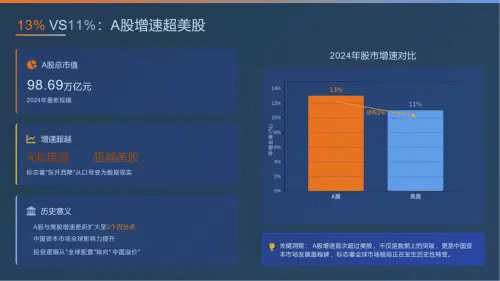I said that the Nasdaq has begun to be outperformed by the Shanghai Composite Index, which is being mocked online as 'Myanmar A-shares', and many people still don't believe it.
As 2024 comes to a close, the total market capitalization of A-shares surged to 98.69 trillion yuan, a year-on-year growth of 13.0%; meanwhile, U.S. stocks recorded 77.01 trillion dollars, a year-on-year increase of 11.0%. The only advantage left for the U.S. stock market is its size and being the dollar market.

Look at the data from 2009 to 2024, the compound growth rate of A-shares' market capitalization is 8.8%, gradually narrowing the gap with U.S. stocks' 9.4% to 0.6 percentage points; while the acceleration in 2024 directly soared to an excessive 47.7%, indicating that the global capital balance is tilting eastward.
China is not a financial country, which has led to poor A-share data for many years; the entire A-share market is dulled.
The market capitalization of A-shares has already achieved an annualized growth rate of 8.8%, while the A-share index is stuck at an annualized growth rate of 0.2%. Do you think this is normal? Rogers is not out of the stock market; he cleared out his U.S. stocks but retained his A-share investments.
When the American financial tower falls, the only three stock markets capable of absorbing the massive outflow of American financial capital are China, the EU, and the UK. America is not foolish and will not watch its financial capital flow into the aforementioned three countries, so the U.S. is working on stablecoins in an attempt to lock in capital outflow through other means. The Trump administration was naively trying to make capital that didn't want to take on stock market risks play a more dangerous Q coin game.
Look at how Buffett, Rogers, and Dalio treat stablecoins.
Rogers chose real gold, platinum + A-shares.
Buffett directly buys government bonds for stable returns.
The world's number one hedge fund, Bridgewater Associates, founded by Dalio, is bearish on all U.S. financial measures.
